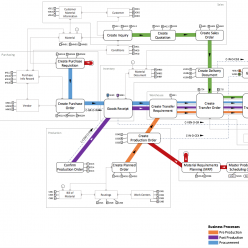This week was mainly dedicated learning about the accounting perspective of an ERP system. Accounting is called the “language of business” because it’s the only way to keep track of all the business transactions and activities
One major topic discussed was handling accounting system for any multi-national organization, where we learned about Charts of Accounts, which segregates companies in three organizational levels: Client, Company Code and Plant and gives a systematic approach to manage accounting for companies operating under different taxation bodies.
Another issue discussed was keeping a track of all the transactions through Documentation (invoice, returns, goods received) rather than just feeding them in system using transaction IDs, which provided more reliable way to record and revive information about any transaction and keep track of all business processes. Further we discovered how documentation is divides into two categories – Material Documents and Virtual Documents.
An elementary aspect of accounting is to understand how and when income or expense is incurred to the company, this concept was comprehended by understanding the Reconciliation Accounts: Accounts Receivable and Accounts Payable and their implementation. Also, how different operating nature of companies (i.e. manufacturing, service, software as service) compel their reconciliation accounts to be implemented differently.
